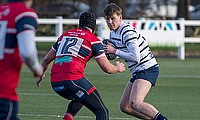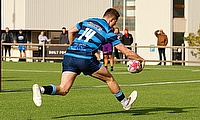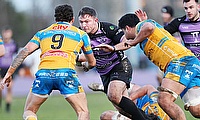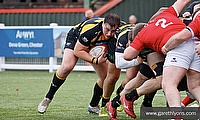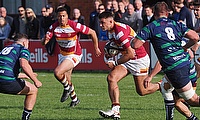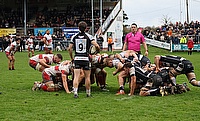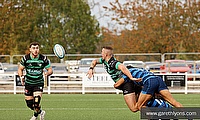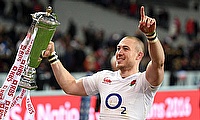Can the Premiership's failings be a positive for National League Rugby?
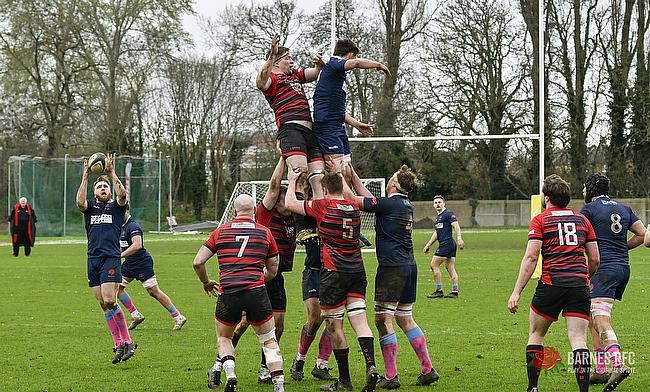
Barnes and Blackheath were the leading sides in National Two East last season
©Jonathan Knight
At the risk of repeating myself, you cannot sugarcoat this season.
As soon as the story broke last week about London Irish's suspension from the Premiership followed by the news they would be filing for administration, it unfortunately confirmed the inevitable. The outcome was depressingly unsurprising given what has unfolded this term as a third top-flight club fell by the wayside.
What has happened to Worcester, Wasps and now Irish is deeply saddening on so many levels and there are hardly, if any, crumbs of comfort to take from this crisis.
But to try and think positively, can we find some light in the darkness of the English game?
Back in April, there was an indication that we could. Jersey Reds clinched the Championship title on the final day of the season and although questions were asked about why Harvey Biljon's side weren't able to gain promotion to the Premiership, the story of their achievement still shone through.
And in National One, there was a title race for the ages. Three clubs - Cambridge, Rams RFC and Sale FC - racked up an astonishing 113 points or more - but it was the Blood and Sand who created history by reaching the second tier for the first-ever time.
"I just don't think people quite realise what is on offer in National League Rugby," Rams RFC Chairman Andy Lynch tells TRU. "The key is getting bums on seats and last season proved that especially in National One. The quality on the pitch is exceptional."
Rams will no doubt head into the new season as one of the favourites to win National One but it wasn't just the third tier that put on a show in 2022-23. National Two North, East and West were far from just a supporting act with title battles and survival scraps equally as compelling.
Barnes, who play in National Two East, finished second behind eventual champions Blackheath: "It is certainly a good league!" Barnes Director of Rugby Jack Heald tells TRU.
"You've got some really high-level, entertaining teams. Worthing play a brand of rugby where if you live on the south coast, you'd pay to go and watch that most weeks. Dorking (who finished third last term) have got a great following and have got good gate receipts. Our gates went up this year quite considerably so the word of mouth and what we are doing, but what other teams are doing too, is great."
It's clear Rams and Barnes were involved in entertaining leagues which captured the imagination. That has to be a plus point for the game but before we search for some more encouragement, what both clubs also have in common - alongside a couple of other teams in National League Rugby including Esher - is the close relationship they had with London Irish.
Both clubs benefitted from the Exiles filtering some of their emerging talent into National One and Two, with the likes of Chunya Munga and Tarek Haffar (who both signed for Northampton Saints this week) Michael Dykes, Louie Kirkham and George Makepeace-Cubitt all gaining valuable experience in levels three and four.
"I would say London Irish, long-term, have always had one of the better, consistently good run programmes," Heald says.
"You have had Neil Hatley there. You've had Billy Clarke and then more recently, you've had Patrick O'Grady and they have all identified and developed boys ready to play first-team rugby, play for England and play for the British and Irish Lions.
"With me working with POG [O'Grady] for example, they've always been very good and open about making sure that these boys develop and play National League Rugby because it is fundamental for them to be playing week in, week out.
"They understood the importance of boys playing a lot of minutes in a season. They are going to learn more by playing at Rams or Esher or us or wherever it is. Their support, and the relationship with us and other clubs, I found them really good to work with."
"You've got the RFU developing playing programme and the great academy system that was being run by London Irish," adds Lynch.
"We've had some good players put on a Rams shirt. For me, these young guys should be playing rugby on a Saturday afternoon. They shouldn't be sat on a bench watching a game. They should be putting on a shirt and playing what is a decent, competitive level of rugby. You have to encourage them to push as far as they can and I think we and London Irish did that."
It is no surprise to hear then that what has happened to Irish does cut deep with the likes of Rams and Barnes who had close links with the Exiles.
"First of all, it's hugely disappointing for everyone involved in rugby that this situation has come to pass," Lynch says. "There were so many great people involved with a club like London Irish - past and present - and that isn't just the players. All the admin staff, the support staff, the supporters, you have got to feel sorry for all of them.
"The other day, Mike Tewkesbury, our player and coach development officer, was on a train into Reading for a meeting with me and he sat near a young lad in a London Irish academy shirt. Mike struck up a conversation with him and this lad was on his way to Reading Tech College to see whether there was a course he could get on to.
"Mike asked him about his rugby and his answer was, 'I don't want to go anywhere near a rugby ball. I've had enough of it.' What a shame. Those kids could be lost to the game. That is why I think the local clubs should be engaged."
There is of course a human element behind all of this but as Lynch hints at, from a National League Rugby point of view, this is where clubs could potentially step in.
To look at it from a player's perspective, especially those at the beginning of their rugby careers, they may - through no fault of their own - have to now tame their expectations and look further down the rugby pyramid in order to continue their journey in the sport.
Heald thinks it is likely his side will be competing with clubs across Berkshire, Hampshire and Middlesex for possible players from London Irish. Teams such as Rams - who are regularly fighting it out at the top of National One - might be a more attractive proposition, but the Barnes boss agrees that players seeking rugby opportunities could benefit the divisions as a collective.
"I think what we may find is at the top end of certainly Nat1 and maybe the top end of Nat2 could actually be of a higher level than we have ever seen because you will see lads coming out of academies and focusing on careers," Heald says.
"I have spoken to a few of the boys at Irish who are now thinking of finishing their degrees and looking at the workplace as a more viable option whilst also carrying on playing.
"The unfortunate thing for us, from Barnes' perspective, some will inevitably sell themselves to the highest bidder. We won't be the highest bidder. We won't be the highest bidder in South-West London in National One and National Two but we have said to all the boys that we know and have a relationship with that we are there to help and support them if they need it but you can see how it could improve the leagues."
Having highlighted the quality of rugby in tiers three and four - as well as the option of combining a career with playing the game - one of the other aspects which could make National League Rugby appealing to players and fans alike is the sustainability of the clubs involved.
Despite the turmoil at the very top of the sport, the 56 teams that make up the leagues have - on the whole - remained defiant in the face of adversity whether that be in the wake of the Covid-19 pandemic or dealing with budget cuts. They haven't lived in a dream world where money grows on trees; they have worked within their means. These clubs are certainly not invincible but sustainability has ruled their thinking.
"I am a great exponent in clubs needing to invest in things other than the success on the field of their first team," Lynch explains. "I think it is really important that you invest in your facilities and your youth policy, for example.
"For the players, Rams also have a really good network of local business people. Not only do we give people rugby whether they are Reading University students or people moving into the area, we've actually placed them in serious employment with prospects not just because they are a rugby player, but because they want to progress their career off the pitch as well. I think that is important.
"For me, running these clubs as a professionally run operation off the pitch is absolutely crucial. You have to be able to make ends meet and you have to be financially viable going forward.
"That then feeds into the on the pitch stuff. If there were people who were London Irish supporters who want to go and watch a decent standard of rugby, I will go and pick them up or I will pay for their taxi if they want to come along to Rams! I know if we get them in there once, they will come back. That is why clubs need to invest in the right way. It will only help themselves and the leagues."
"I think the first thing is the majority of clubs at our level are probably here to say," Heald concludes. "From our point of view, we know the identity of what Barnes are and we know what we can do long-term. We won't be planning anything we can't sustain. We are just looking forward to next season now. We know it is going to be a tough year but that's what makes these leagues great and hopefully they will continue to grow."


